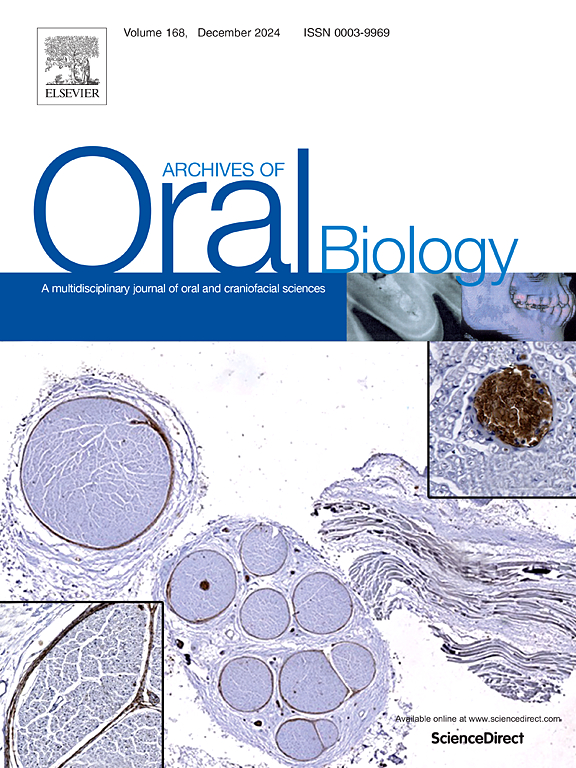Potential impact of micro-196a2 and Toll-like receptor 2 gene polymorphisms on oral cancer prognosis and susceptibility
IF 2.1
4区 医学
Q2 DENTISTRY, ORAL SURGERY & MEDICINE
引用次数: 0
Abstract
Objective
Despite advances in diagnosis and treatment in recent years, oral squamous cell carcinoma (OSCC) is still associated with a high recurrence rate and poor survival. MiR-196a2 and TLR2 have been implicated in cancer progression and prognosis, but the significance of their genetic variants in OSCC remains unelucidated.
Design
This study investigated the miR-196a2 rs11614913 and TLR2 rs5743708 genetic variants in Caucasian HPV-negative OSCC patients (n = 95) and age- and sex-matched healthy controls (n = 108) using real-time PCR. An assessment was conducted on their association with clinicopathological features, overall survival (OS), recurrence-free survival (RFS) and OSCC risk.
Results
OSCC patients carrying the miR-196a2 rs11614913 TT genotype had a higher risk of tumor recurrence (P = 0.045) and shorter RFS (P = 0.041). The proportional hazards assumption was violated for tumor stage. Stage-stratified Kaplan-Meier analysis showed that miR-196a2 rs11614913 genotypes and combined CC+CT vs. TT variants significantly affected RFS in stage I/II OSCC patients (P = 0.012 and P = 0.003, respectively), but not in advanced stage III/IV patients (P = 0.545 and P = 0.287, respectively). Cox regression confirmed miR-196a2 rs11614913 as an independent predictor of RFS in early stage (HR=3.407, P = 0.015), but not in advance stage patients (HR=1.090, P = 0.711). No significant associations with OS were found. Additionally, the TLR2 rs5743708 variant allele A was significantly associated with a lower risk of OSCC (Adjusted OR=0.406, P = 0.013).
Conclusions
These findings suggest that miR-196a2 rs11614913 could play a stage-dependent role in RFS, influencing early-stage OSCC but losing prognostic significance in advanced disease. Additionally, TLR2 rs5743708 may contribute to the decreased OSCC risk.
微-196a2和toll样受体2基因多态性对口腔癌预后和易感性的潜在影响
目的尽管近年来口腔鳞状细胞癌(oral squamous cell carcinoma, OSCC)的诊断和治疗取得了进展,但其复发率仍较高,生存率较差。MiR-196a2和TLR2与癌症进展和预后有关,但其遗传变异在OSCC中的意义尚不清楚。本研究利用实时荧光定量PCR技术研究了高加索人hpv阴性OSCC患者(n = 95)和年龄和性别匹配的健康对照(n = 108)中miR-196a2 rs11614913和TLR2 rs5743708的遗传变异。评估其与临床病理特征、总生存期(OS)、无复发生存期(RFS)和OSCC风险的关系。结果携带miR-196a2 rs11614913 TT基因型的soscc患者肿瘤复发风险较高(P = 0.045),RFS较短(P = 0.041)。肿瘤分期不符合比例风险假设。分期分层Kaplan-Meier分析显示,miR-196a2 rs11614913基因型和CC+CT与TT联合变异显著影响I/II期OSCC患者的RFS (P = 0.012和P = 0.003),但对晚期III/IV期患者无影响(P = 0.545和P = 0.287)。Cox回归证实miR-196a2 rs11614913是早期患者RFS的独立预测因子(HR=3.407, P = 0.015),但在晚期患者则不是(HR=1.090, P = 0.711)。未发现与OS有显著关联。此外,TLR2 rs5743708变异等位基因A与较低的OSCC风险显著相关(调整后OR=0.406, P = 0.013)。结论这些发现提示miR-196a2 rs11614913可能在RFS中发挥分期依赖性作用,影响早期OSCC,但在晚期疾病中失去预后意义。此外,TLR2 rs5743708可能有助于降低OSCC风险。
本文章由计算机程序翻译,如有差异,请以英文原文为准。
求助全文
约1分钟内获得全文
求助全文
来源期刊

Archives of oral biology
医学-牙科与口腔外科
CiteScore
5.10
自引率
3.30%
发文量
177
审稿时长
26 days
期刊介绍:
Archives of Oral Biology is an international journal which aims to publish papers of the highest scientific quality in the oral and craniofacial sciences. The journal is particularly interested in research which advances knowledge in the mechanisms of craniofacial development and disease, including:
Cell and molecular biology
Molecular genetics
Immunology
Pathogenesis
Cellular microbiology
Embryology
Syndromology
Forensic dentistry
 求助内容:
求助内容: 应助结果提醒方式:
应助结果提醒方式:


